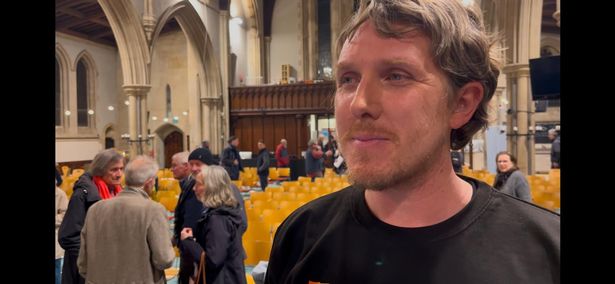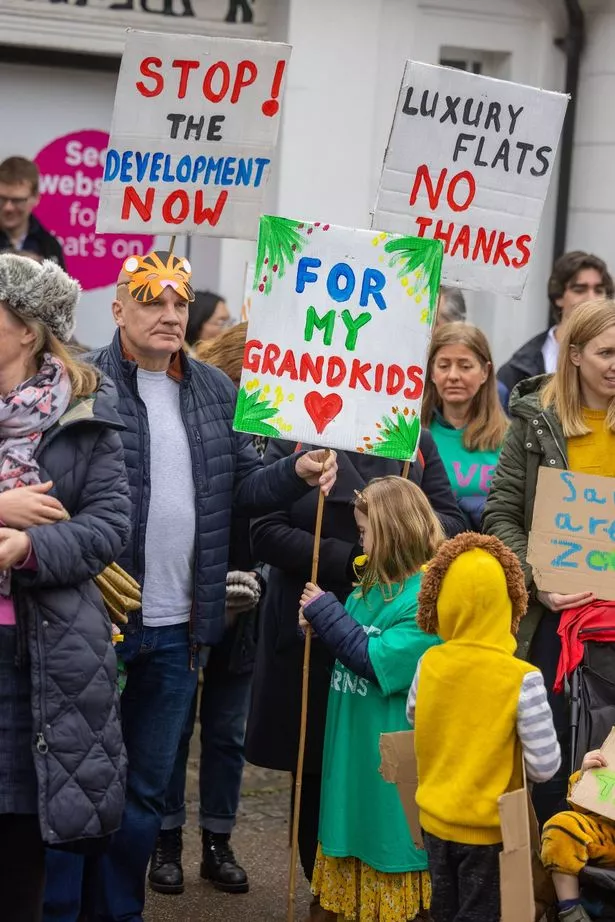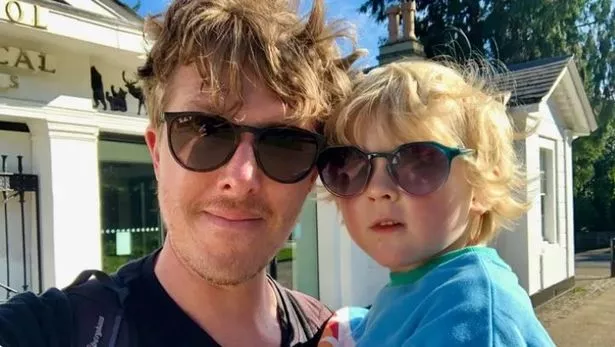Beacon bosses have paid thousands in compensation![]() The Bristol Beacon(Image: reach)
The Bristol Beacon(Image: reach)
A man who tried to launch a major campaign to save Bristol Zoo has received thousands of pounds in compensation from the Bristol Beacon – because the venue cancelled his booking for the launch event after the boss of the zoo privately intervened. Bosses at the Beacon, which is owned by the city council, later tried to silence campaigner Tom Jones by offering compensation, but only if he dropped his attempts to investigate the cancellation and sign a non-disclosure agreement.
Mr Jones, from the Save Bristol Zoo campaign, booked one of the venue spaces at the Bristol Beacon to hold a public meeting on April 29 this year. The event was to be a public meeting to launch a renewed campaign calling on Bristol Zoo to make a U-turn on its decision to close and redevelop the site in Clifton.
Mr Jones had raised thousands of pounds from a fundraising appeal and spent that and his own money on marketing and publicity for the meeting. What happened next left people who donated questioning what had happened to their money, and Mr Jones initially unable to talk about it.
Hundreds of people were expected to come to the high profile event. Mr Jones said former zoo staff and an international zoo expert would speak out about the zoo’s current strategy of closing the Clifton site and expanding at the Bristol Zoo Project in South Gloucestershire.
Last November, Bristol Zoological Society’s boss Justin Morris told Bristol Live one of the issues he had with the campaigns to stop the zoo’s redevelopment was that campaigners had never put forward viable alternative plans. Mr Jones said the purpose of the public meeting at the Beacon was to offer an alternative vision.
The meeting was timed in late April this year to coincide with the start of a separate judicial review, which saw other campaigners in Clifton challenging the council’s decision to award planning permission for the redevelopment of the zoo site in the courts.
 Tom Jones from the Save Bristol Zoo campaign(Image: Bristol Post)
Tom Jones from the Save Bristol Zoo campaign(Image: Bristol Post)
Mr Jones’ Save Bristol Zoo launch event was heavily publicised. He spent thousands of pounds to print and deliver leaflets advertising the event to 35,000 homes around Clifton and Bristol, as well as spending thousands more from money he had raised to present the ‘alternative vision’ for a reopened Bristol Zoo, after working with former employees and industry experts.
The cancellation
Seven days before the event, Bristol Beacon told him they had cancelled his booking. Emails seen by Bristol Live show that earlier that day, Bristol Zoo chief executive Justin Morris emailed Simon Wales, his counterpart at the Bristol Beacon, to raise concerns about the event – and just a few hours later, Mr Jones was told the booking had been cancelled, with no discussion.
Mr Jones didn’t receive a refund of his booking fee of a little over £1,000 until after the date the meeting was supposed to happen and, with all the publicity material advertising an event at the Bristol Beacon, he said he reluctantly had to cancel the event altogether. He said there was no time to find an alternative venue and none available – and there was no way of contacting the 35,000 homes that had received flyers, to tell them the venue had changed.
Mr Jones immediately demanded to know why his booking had been cancelled, and Bristol Beacon’s management eventually said his event ‘breached the hire agreement’. Three weeks later, he received an email which finally gave an explanation.
READ MORE: Legal challenge against Bristol zoo site 200 homes plan starts todayREAD MORE: Bristol Zoo boss says ‘we’ve never seen’ a viable alternative plan
“You will appreciate that, as a registered Bristol charity, hosting an event that was widely publicised online for the purpose of rallying against another Bristol charity’s board raised significant concerns for us, both from a public safety and reputational perspective,” the email from Bristol Beacon chief executive Mr Wales said.
It added a reference to clauses in the booking terms, including one which ‘covers activities that might pose a danger to public safety, including the safety of persons present at the event and any of our staff’, and another which allowed the Bristol Music Trust – the council-owned charity which runs the Beacon – to cancel an event if it ‘poses a risk to Bristol Music Trust’.
“After careful thought, the decision was made to cancel your booking based on the above Information,” Mr Wales added.
Mr Jones claims the booking was taken with Beacon staff knowing what the event was going to be about, although the Beacon disputes this saying it made the decision after becoming aware of the petition. It was billed as a Save Bristol Zoo event and as the launch of an ‘alternative vision’ to the one laid out by the Zoo itself. But internal emails seen by Bristol Live subsequently revealed that the event was cancelled just hours after Mr Wales had received an email from Justin Morris, the chief executive of Bristol Zoo.
That email, sent by Mr Morris at 11.54am on April 22, raised his concerns about Mr Jones’ Save Bristol Zoo campaign, and an online petition.
The emails between Mr Morris to Mr Wales were heavily redacted in the later release of a Subject Access Request file, but Bristol Live is publishing it in full. Mr Morris sent Mr Wales a link to the Save Bristol Zoo petition, and told him: “The statements being made are not new, and in most cases false, and we have responded publicly to them previously.”
READ MORE: Bristol Zoo nets more than £160,000 as bidding for zoo items goes crazyREAD MORE: How the fate of Bristol Zoo’s Clifton site hangs in the balance
Mr Morris added: “As you might imagine, we are taking legal advice. I wasn’t sure if you were aware of any of this so thought worth sharing. If it would be helpful to discuss, don’t hesitate to let me know,” he added.
It is not known whether there was any subsequent phone conversation between Mr Wales and Mr Morris that day, but early that afternoon, Mr Jones was called by Bristol Beacon staff and told his booking had been cancelled.
At the end of that day, April 22, Mr Wales replied from the Bristol Beacon to Mr Morris at the zoo to confirm that the Beacon had now cancelled the Save Bristol Zoo meeting.
“I certainly wasn’t aware that this booking had been accepted, and our commercial team (who have handled the booking) were not aware of the contents of what was being proposed/discussed, and the existence of the petition,” Mr Wales told the zoo boss.
“As we do not wish to be associated with this petition in any way, I have asked the booking team to relocate the confirmed booking to another venue (eg a hotel conference suite), and they are exploring options now,” he added.
 (Image: PAUL GILLIS / Reach PLC)
(Image: PAUL GILLIS / Reach PLC)
Mr Jones was directed by the Beacon to nearby hotels with conference centre facilities that might host the event at short notice, but it wasn’t possible.
The following day, Mr Wales updated Mr Morris at the Zoo about the likelihood that the event might be taking place somewhere else. He told the Zoo chief executive that the Beacon’s booking manager had been ‘in touch with Visit West’, which oversees the hotel industry in Bristol, ‘and having been given the heads up about the petition, they don’t feel that their conference team can take this on’.
Three weeks later, after finally refunding the booking fee, Mr Wales wrote to Mr Jones and said that, since he’d had the fee refunded, they now considered the matter closed. But Mr Jones said he was left outraged – and out of pocket.
What happened next
In the weeks and months that followed, Tom Jones became embroiled in a legal row with the Bristol Beacon, which meant that the actual Save Bristol Zoo campaign did not get off the ground. And at the same time, some of the people who had donated money to get the campaign started began asking questions about what had happened to their money.
Mr Jones challenged the Bristol Beacon again and asked for the venue to refund the costs he’d incurred in publicising and setting up the meeting – just over £3,500 on top of the £1,300 booking fee he’d already been refunded.
In emails seen by Bristol Live, he repeatedly asked Beacon bosses if they had been influenced to cancel the booking by anyone at Bristol Zoo. He told Bristol Beacon that he disagreed with their description of the public meeting he had been organising, and was considering taking the Beacon to a small claims court to get them to pay for the campaign money he’d spent before the event, telling them he had a good case that the Beacon had acted unreasonably.
The day after the cancellation, the Beacon’s chief executive continued to update Justin Morris and Bristol Zoo, to reassure him his involvement would be kept quiet.
 Simon Wales, who was appointed Chief Executive of Bristol Beacon in May 2024(Image: Bristol Music Trust)
Simon Wales, who was appointed Chief Executive of Bristol Beacon in May 2024(Image: Bristol Music Trust)
Mr Wales emailed Mr Morris and wrote that the Beacon had: “told Tom that it’s because we are now aware of the public petition and we can’t support this or be associated with it. Tom has of course asked if we’ve been contacted by anyone at the zoo and we’ve said we’re aware of the petition, nothing more.”
In early May, emails seen by Bristol Live reveal senior management at the Bristol Beacon discussed what to do about Tom Jones’ complaints and how to justify the cancellation, as Mr Jones was continuing to ask why his event had been cancelled and whether pressure from the zoo had anything to do with it.
The Beacon’s chief operating officer Clare Jack wrote in an internal email: “I think we are not obliged to answer his questions. I think we just refund asap and hope he then desists.” On the same day in response, the Beacon’s Head of Commercial Business Development wrote: “I will not answer any other questions he has asked.”
Chief executive Simon Wales replied to them both: “We can keep not answering the questions but Clare, if they pursue this we might need to seek some contractual advice.”
The next day Mr Wales asked staff if the cancellation was legally justified. “Are we within our rights to say this isn’t appropriate for a public meeting being held on our premises?” he asked his chief operating officer.
After not getting any answers from the Beacon, Mr Jones then submitted a Subject Access Request – which allows any person to ask a public organisation what data they have stored about them – which would reveal any internal or external emails that mention him in the run up to the cancellation and afterwards.
Bristol Beacon’s response was to – eventually – offer to compensate Mr Jones thousands of pounds, but only on the condition that he withdrew the Subject Access Request and signed a Non-Disclosure Agreement.
That NDA would have meant he wasn’t able to ever explain publicly why the event had been cancelled, talk about his suspicions that Justin Morris at Bristol Zoo had got involved, or the fact the Beacon had even paid him compensation.
Mr Jones told Bristol Live he agonised over the decision, but in the end decided not to sign and to press on with the Subject Access Request, and the challenge to get compensation. At the end of July, the Beacon finally agreed to pay the compensation, on the condition that Mr Jones didn’t later take them to court over the issue.
A day later, the Subject Access Request information came through, revealing that the campaign launch had indeed been cancelled by the Beacon hours after Justin Morris contacted the Beacon’s chief executive.
What Bristol Zoo said Dr Justin Morris, chief executive of the Bristol Zoological Society
Dr Justin Morris, chief executive of the Bristol Zoological Society
Bristol Live asked Bristol Zoo why its chief executive decided to contact Bristol Beacon about its booking. “Justin emailed the Chief Executive of the Bristol Beacon to check he knew the event was happening,” a spokesperson said.
“Justin shared the information he had about a public meeting – which had already been advertised by the Save Bristol Zoo Campaign, in leaflets and on its website.”
What Bristol Beacon said
Bristol Live asked Bristol Beacon a series of questions about the cancellation and the way it handled the Save Bristol Zoo campaign afterwards.
The Beacon was asked what influence the email from Justin Morris had on the decision to cancel the booking within hours, how the proposed event breached the Beacon’s hire agreement terms, which part of the event would have ‘posed a danger to public safety’ and a ‘risk to Bristol Music Trust’?
Bristol Live also asked Bristol Beacon why no one from the venue spoke to Tom Jones about their concerns around the petition before deciding the event was cancelled. The Beacon was also asked why, if the venue was confident the event did breach its guidelines, the Beacon had agreed to pay compensation over and above simply refunding the booking charge.
Bristol Live also asked why the Bristol Beacon initially demanded Mr Jones drop his Subject Access Request in return for being given the compensation he was looking for, and why the Beacon initially offered Mr Jones compensation but only if he signed a Non-Disclosure Agreement.
![]() The Bristol Beacon(Image: reach)
The Bristol Beacon(Image: reach)
The Beacon declined to answer those questions directly, and instead provided a statement. “Bristol Music Trust accepted the booking made by Mr Jones on the basis that the event being organised on behalf of the Save Bristol Zoo Gardens campaign was a ‘launch plan for the future’,” it said.
“Only after the booking was contracted were we made aware of an online petition calling for the resignation of the current leadership of Bristol Zoological Society. As a charitable organisation, Bristol Music Trust would not host an event organised by a group calling for the resignation of the leadership of another charitable organisation, as it is likely to cause significant reputational damage to both parties.
“On this basis we cancelled the booking and proceeded to refund Mr Jones’ booking fee. Mr Jones further requested that we compensate him for unrecoverable costs, which we agreed to do. We also worked with city partners to try to find a suitable alternative venue as a gesture of goodwill. As a charitable organisation, we remain committed to hosting inclusive community events that bring people together,” they added.
What Save Bristol Zoo said
Tom Jones said the affair has shaken his faith in Bristol’s city-owned institutions and charities. “I am incredibly glad that I chose not to sign a non-disclosure agreement and withdraw my Subject Access Request in return for Bristol Beacon buying my silence,” he said.
“Bristol Beacon – an institution which until recently I held in high regard – tried to leverage my request to be repaid several thousand pounds of publicity and marketing costs for the cancelled meeting, in order to persuade me to drop my Subject Access Request, the findings of which, the Beacon’s senior leadership knew would be deeply embarrassing for them.
“I don’t know about any of my fellow Bristolians, but the fact that our flagship concert venue and music charity behaved in this way is, to me, incredibly disappointing and deeply shocking.
 Tom Jones, who is leading a campaign to ‘Save Bristol Zoo'(Image: Tom Jones)
Tom Jones, who is leading a campaign to ‘Save Bristol Zoo'(Image: Tom Jones)
“For weeks and months on end, Bristol Beacon’s management maintained that no-one from Bristol Zoological Society had intervened to influence their decision to cancel the April 29 meeting. However, internal emails that the Beacon’s leadership tried to suppress, show otherwise.
“Bristol Beacon’s management can say all they want that they ‘would not host an event organised by a group calling for the resignation of the leadership of another charitable organisation’. But to be absolutely clear, the primary purpose of the event was to present for the first time, the alternative plan that had been developed for Bristol Zoo Gardens by many ex-Bristol Zoo staff and industry zoo experts, as was advertised on the flyer promoting the event.
“The fact that the alternative plan has still not been publicly released over five months later due to the ongoing legal issues, means that its value – on which I spent thousands of pounds of money that I had raised to fund its development – has significantly diminished.
“Within the context of freedom of speech, would there have been some critical comments made about Bristol Zoological Society’s leadership at the event, backed up by huge amounts of evidence-based research? Yes, and I have no doubt that the meeting would have been highly inconvenient and potentially embarrassing for a tiny minority of people in positions of power at Bristol Zoological Society.
“But to say that the meeting ‘raised significant concerns from a public safety and reputational perspective’ for Bristol Beacon, does not stand up to serious scrutiny. And crucially, according to legal advice I received, the existence of the petition did not breach the hire agreement which I had signed.
READ MORE: Bristol Zoo shares update on gorillas living at old site after repeated break-insREAD MORE: Bristol zoo welcomes endangered primates visitors will hear before they see them
“I can only assume therefore that this is why the Beacon’s leadership were so keen for me to sign something to ensure I cannot take them to court over this. It is also worth asking, if anyone at the Beacon did have any concerns about the content of the meeting, why did no one take the time to pick up the phone and call me, before any decisions were made to cancel the meeting?
“For Bristol Beacon to claim that the meeting would have been ‘dangerous, noxious, offensive, immoral, cause a breach to the peace, illegal, or pose a danger to public safety’ including the safety of staff, in my opinion, does not stand up to serious scrutiny,” he added.
Mr Jones explained why he refused to take the deal offered by Bristol Beacon.
“Internal emails clearly show that Bristol Beacon only agreed to compensate me for unrecoverable costs, after a lengthy legal wrangle and trying to leverage me with a withdrawal of my Subject Access Request and signing an NDA. This would have meant I was never able to publicly explain why the meeting was cancelled,” he added.
“For example, if I were to organise another public meeting about the zoo in the future, why would people trust me or attend, given what happened the last time, if I could not explain the circumstances around the previous cancellation? How could people have confidence in any future events if this unanswered issue were to hang over the campaign?” he said.
“The bottom line is that the CEO of Bristol Zoological Society personally emailed the CEO of Bristol Beacon about a meeting due to take place at the Beacon, citing a petition calling for him to stand down and then hours later, the meeting had been cancelled.
“This whole episode has damaged the reputation of the Save Bristol Zoo Gardens campaign as well as me personally. It has cost me a huge amount of time and consequently money, and caused me considerable stress which has negatively impacted my mental health. I hope senior figures at Bristol Beacon are held to account for what has transpired as I for one, no longer have any faith in its senior leadership,” he added.
“Everything about the cancellation of the zoo meeting is a very serious matter and bad for Bristol. Until April, I believed Bristol Beacon was a place that championed free speech, diversity, inclusion and welcomed people from all of Bristol, many of whom no doubt hold opposing views.
“As I have already said, given the diversity of events and acts that Bristol Beacon is proud to host, a meeting about the future of a historic and beloved Bristol institution in which there is strong public interest, would only have added to that rich tapestry. I would also fully expect that Bristol Zoological Society would be free to hold its own public meeting at the Beacon, should it so choose.
“My Subject Access Request has revealed that there has been a clear attempt to suppress legitimate debate and free speech about the future of our city between people at the top of two significant Bristol institutions.
“The bigger question all of this raises for me is; what else is going on in our city that people in positions of power don’t want us – the people – to know about?” he added.